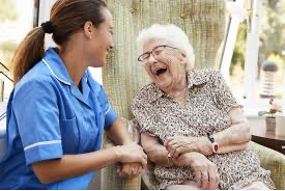Article 1
The Importance of Home Care for the Elderly

Home care for the elderly plays a crucial role in improving their quality of life, especially as they age and face physical and health challenges that may limit their independence. Many seniors prefer to stay at home rather than move to a nursing home, as it provides them with a sense of security and psychological comfort.
1. Maintaining the Autonomy of the Elderly
Home care allows the elderly to continue living according to their daily routines, thereby strengthening their sense of independence and dignity. By staying in a familiar environment, surrounded by their belongings and loved ones, they avoid the sense of isolation or strangeness often felt in specialized institutions.
2. Personalized and Tailored Care
Through home care, the elderly receive individualized attention that addresses their specific needs. Caregivers understand the medical and personal requirements of each individual and adjust their support accordingly. This may include assistance with daily tasks like eating, hygiene, and dressing, as well as basic medical care such as blood pressure checks or administering medication on time.
3. Psychological and Emotional Support
The psychological aspect of care is just as important as physical support. Staying at home allows the elderly to maintain constant connections with family and friends, enhancing their sense of belonging and emotional well-being. Furthermore, the continuous presence of caregivers helps reassure seniors and provides invaluable support during difficult times, reducing the risks of loneliness and anxiety.
4. Lower Costs Compared to Nursing Homes
In many cases, home care is a more affordable alternative to specialized institutions. Families can adjust the level of assistance needed based on their budget, combining professional help with support from loved ones. Additionally, avoiding a move to a care facility reduces expenses related to adapting to a new environment.
5. Improving Quality of Life
Home care directly contributes to the well-being of the elderly, offering them peace of mind and a reassuring, familiar setting. Seniors who receive home assistance feel more involved in their family and social lives, which positively impacts their mood and overall health. This approach also helps reduce the risk of depression or anxiety often associated with isolation.
6. Regular Medical Monitoring
Home care also includes close monitoring of the elderly’s health. Caregivers work in collaboration with doctors and nurses to ensure that the elderly take their medication on time and undergo necessary medical exams. This preventive follow-up allows for better management of chronic diseases like diabetes and hypertension, helping to avoid health complications.
Home care for the elderly is an ideal solution for families concerned about the well-being and dignity of their loved ones as they age. By providing not only physical assistance but also psychological and emotional support, this approach enables seniors to feel safe and surrounded, all while staying in the comforting environment of their home.
